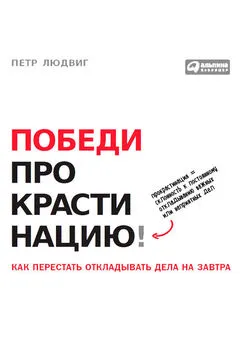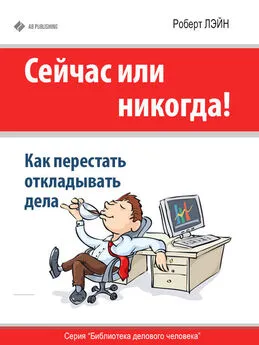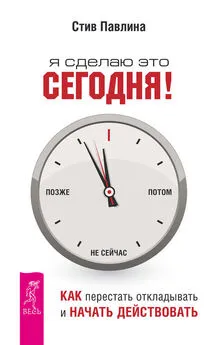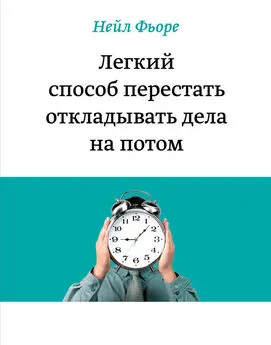Петр Людвиг - Победи прокрастинацию! Как перестать откладывать дела на завтра
- Название:Победи прокрастинацию! Как перестать откладывать дела на завтра
- Автор:
- Жанр:
- Издательство:Array Литагент «Альпина»
- Год:2014
- Город:Москва
- ISBN:978-5-9614-3557-3
- Рейтинг:
- Избранное:Добавить в избранное
-
Отзывы:
-
Ваша оценка:
Петр Людвиг - Победи прокрастинацию! Как перестать откладывать дела на завтра краткое содержание
Победи прокрастинацию! Как перестать откладывать дела на завтра - читать онлайн бесплатно ознакомительный отрывок
Интервал:
Закладка:
88. Lidz, C.S . Early childhood assessment. New York: John Wiley, 2003.
89. Linden, D.J . The compass of pleasure: how our brains make fatty foods, orgasm, exercise, marijuana, generosity, vodka, learning, and gambling feel so good. New York: Viking, 2011.
90. Lövheim, H . A new three-dimensional model for emotions and monoamine neurotransmitters // Medical Hypotheses. 2012. Vol. 78. № 2. P. 341–348.
91. Lyubomirsky, S., Sheldon, K.M., Schkade, D . Pursuing happiness: The architecture of sustainable change. Riverside (СA): UC Riverside, 2005.
92. Maclean, P.D . The triune brain in evolution: role in paleocerebral functions. New York: Plenum Press, 1990.
93. Marchand W.R., Dilda D.V., Jensen C.R . Neurobiology of mood disorders // Hospital Physician. 2005. Vol. 41. №. 9. P. 17–26, 43.
94. Markoff, J . The iPad in Your Hand: As Fast as a Supercomputer of Yore // The New York Times: Bits [online]. 2011. URL: http://bits.blogs.nytimes.com/2011/05/09/the-ipad-in-your-hand-as-fast-as-a-supercomputer-of-yore/.
95. Mascaró, J . The Dhammapada: the path of perfection. Harmondsworth: Penguin, 1973.
96. Maurer, R., Hirschman, L.A . The spirit of kaizen: creating lasting excellence one small step at a time. New York: McGraw-Hill, 2013.
97. Mead, N.L., Baumeister, R.F., Gino, F., Schweitzer, M.E., Ariely, D . Too tired to tell the truth: Self-control resource depletion and dishonesty // Journal of Experimental Social Psychology. 2009. Vol. 45. № 3. P. 594–597.
98. Miller, E.K., Freedman, D.J., Wallis, J.D. The prefrontal cortex: categories, concepts and cognition // Philosophical Transactions of the Royal Society B: Biological Sciences. 2002. Vol. 357. № 1424. P. 1123–1136.
99. Miller, G.A . The magical number seven, plus or minus two: some limits on our capacity for processing information // Psychological Review. 1956. Vol. 63. № 2. P. 81–97.
100. Morrison, M., Roese, N . Regrets of the typical American: Findings from a nationally representative sample // Social Psychological and Personality Science. 2011. Vol. 2. № 6. P. 576–583.
101. Musch, J., Ehrenberg, K . Probability misjudgment, cognitive ability, and belief in the paranormal // British Journal of Psychology. 2002. Vol. 93. № 2. P. 169–177.
102. Nash, J.F. Jr . Autobiography // The Official Web Site of the Nobel Prize [online]. 1995. URL: http://www.nobelprize.org/nobel_prizes/economics/laureates/1994/nash.html.
103. Nestler, E.J . The Neurobiology of Cocaine Addiction // Science & Practice Perspectives. 2005. Vol. 3. № 1. P. 4–10.
104. Nitobe, I . Bushido: the soul of Japan: a classic essay on samurai ethics. Tokyo: Kodansha International, 2002.
105. NOVO NORDISK. Changing diabetes. [online]. URL: http://www.novonordisk.com/about_us/changing-diabetes/default.asp.
106. NOVO NORDISK. Novo Nordisk annual report 2012 [online]. URL: http://novonordisk.com/investors/annual-report-2012/default.asp
107. Panicucc, J., Prouty, D., Collinson, R . Adventure education: theory and applications. Champaign (IL): Human Kinetics, 2007.
108. Pausch, R., Zaslow, J . The last lecture. New York: Hyperion, 2008.
109. Peterson, C., Maier, S.F., Seligman, M.E.P . Learned helplessness a theory for the age of personal control. New York: Oxford Univ. Press, 1993.
110. Pink, D.H . Drive: the surprising truth about what motivates us. New York: Riverhead Books, 2011.
111. Pinker, S. The better angels of our nature: why violence has declined. New York: Viking, 2011.
112. Prigatano, G.P., Schacter, D.L . Awareness of deficit after brain injury: clinical and theoretical issues. New York: Oxford University Press, 1991.
113. Princeton University. Mental Models & Reasoning [online]. 2013. URL: http://mentalmodels.princeton.edu/
114. Redelmeier, D.A . Medical Decision Making in Situations That Offer Multiple Alternatives // The Journal of the American Medical Association. 1995. Vol. 273. № 4. P. 302–305.
115. Ridley, M . The origins of virtue: human instincts and the evolution of cooperation. London: Penguin Books, 1998.
116. Ridley, M . The red queen: sex and the evolution of human nature. New York: Perennial, 2003.
117. Ruse, M . Charles Darwin and group selection // Annals of Science. 1980. Vol. 37. № 6. P. 615–630.
118. Seligman, M.E.P . Learned optimism: how to change your mind and your life. New York: Vintage Books, 2006.
119. Seligman, M.E.P . Helplessness: on depression, development, and death. New York: W.H. Freeman, 1992.
120. Seligman, M.E.P . Authentic happiness: using the new positive psychology to realize your potential for lasting fulfillment. New York: Free, 2002.
121. Seligman, M.E.P . Flourish: a visionary new understanding of happiness and well-being. New York: Free Press, 2012.
122. Seligman, M.E.P . Learned Helplessness // Annual Review of Medicine. 1972. Vol. 23. № 1. P. 407–412.
123. Seligman, M.E.P., Steen, T.A., Park, N., Peterson, C . Positive Psychology Progress: Empirical Validation of Interventions // American Psychologist. 2005, Vol. 60. № 5. P. 410–421.
124. Seligman, M.E., Rosellini, R.A., Kozak, M.J . Learned helplessness in the rat: Time course, immunization, and reversibility // Journal of Comparative and Physiological Psychology. 1975. Vol. 88. № 2. P. 542–547.
125. Semendeferi, K., Damasio, H., Frank, R., Van Hoesen, G.W . The evolution of the frontal lobes: a volumetric analysis based on three-dimensional reconstructions of magnetic resonance scans of human and ape brains // Journal of Human Evolution. 1997. № 32. P. 375–388.
126. Sheldon, K.M., Lyubomirsky, S . Achieving Sustainable Gains in Happiness: Change Your Actions, not Your Circumstances // Journal of Happiness Studies. 2006. Vol. 7. № 1. P. 55–86.
127. Shermer, M . The Believing Brain From Ghosts and Gods to Politics and Conspiracies: How We Construct Beliefs and Reinforce Them As Truths. New York: St. Martin‘s Griffin, 2012.
128. Shin, D.C . Does rapid economic growth improve the human lot? Some empirical evidence // Social Indicators Research. 1980. Vol. 8. № 2. P. 199–221.
129. Shin, J., Ariely, D . Keeping Doors Open: The Effect of Unavailability on Incentives to Keep Options Viable // Management Science. 2004. Vol. 50. № 5. P. 575–586.
130. Schneider, T.A., Butryn, T.M., Furst, D.M., Masucci, M.A . A Qualitative Examination of Risk Among Elite Adventure Racers // Journal of Sport Behavior. 2007. Vol. 30. № 3.
131. Schoenemann, P.T . Evolution of the Size and Functional Areas of the Human Brain // Annual Review of Anthropology. 2006. Vol. 35. № 1. P. 379–406.
132. Schwartz, B. The paradox of choice: why more is less. Reissued. New York: Harper Perennial, 2005.
133. Schwartz, B., Ward, A., Monterosso, J., Lyubomirsky, S., White, K., Lehman, D.R . Maximizing versus satisficing: Happiness is a matter of choice // Journal of Personality and Social Psychology. 2002. Vol. 83. № 5. P. 1178–1197.
134. Schwarz, N., Clore, G.L . Mood, misattribution, and judgments of well-being: Informative and directive functions of affective states // Journal of Personality & Social Psychology. 1983. Vol. 45. № 3. P. 513–523.
135. Schwarz, N., Strack, F . Reports of subjective well-being: Judgmental processes and their methodological implications // Well-being: The foundations of hedonic psychology / D. Kahneman, E. Diener, N. Schwarz (Eds.) New York: Russell Sage Foundation, 1999. P. 61–84.
136. Steel, P . The nature of procrastination: A meta-analytic and theoretical review of quintessential self-regulatory failure // Psychological Bulletin. 2007. Vol. 133. № 1. P. 65–94.
137. Steel, P . The procrastination equation: how to stop putting things off and start getting stuff done. New York: Harper, 2011.
138. Suvorov, A . Addiction to rewards. Toulouse: Toulouse School of Economics, 2003.
139. Sweeney, P.D., Anderson, K., Bailey, S . Attributional style in depression: A meta-analytic review // Journal of Personality and Social Psychology. 1986. Vol. 50. № 5. P. 974–991.
140. Tabak, L . If Your Goal Is Success, Don‘t Consult These Guru // Fast Company [online]. 1996. URL: http://www.fastcompany.com/27953/if-your-goal-success-dont-consult-these-gurus
141. Tedeschi, R.G., Calhoun, L.G . Target article: «Posttraumatic Growth» // Psychological Inquiry. 2004. Vol. 15. № 1. P. 1–18.
142. The Anatomical Basis of Anosognosia – Backgrounder // Treatment Advocacy Center [online]. 2012. URL: http://www.treatmentadvocacycenter.org/about-us/our-reports-and-studies/2143.
143. Thomson Reuters // Web Of Knowledge: Discovery starts here [online]. 2013. URL: http://www.webofknowledge.com
144. Tice, D.M., Baumeister, R.F., Shmueli, D., Muraven, M . Restoring the self: Positive affect helps improve self-regulation following ego depletion // Journal of Experimental Social Psychology. 2007. Vol. 43. № 3. P. 379–384.
145. U.S. Army. Comprehensive Soldier & Family Fitness: Building Resilience & Enhancing Performance [online]. 2013. URL: http://csf2.army.mil/.
146. Vallar, G., Ronchi, R . Anosognosia for motor and sensory deficits after unilateral brain damage: A review // Restorative neurology and neuroscience. 2006. Vol. 24. № 4. P. 247–257.
147. Veenhoven, R . Erasmus University Rotterdam. World Database of Happiness [online]. 2012. URL: http://worlddatabaseofhappiness.eur.nl/.
148. Von Neumann, J . Theory of games and economic behavior. 16th yrbk. Princeton (Mass): Princeton University Press, 2004.
149. Vosoba, P . Dokonalá manažerská selhání: neobyčejná rešení obyčejných problému. Praha: Grada, 2008.
150. Vuilleumier, P . Anosognosia: The Neurology of Beliefs and Uncertainties // Cortex. 2004. Vol. 40. № 1. P. 9–17.
151. Ware, C . Information visualization: perception for design. 3th ed. Waltham (Mass.): Morgan Kaufmann, 2012.
152. Watkins, P.C., Vache, K., Verney, S.P., Mathews, A . Unconscious mood-congruent memory bias in depression // Journal of Abnormal Psychology. 1996. Vol. 105. № 1. P. 34–41.
153. Wessinger, C . How the millennium comes violently: from Jonestown to Heaven‘s Gate. New York: Seven Bridges Press, 2000.
154. Where can I find the Yale study from 1953 about goal-setting? // University of Pennsylvania Library [online]. 2002. URL: http://faq.library.yale.edu/recordDetail?id=7508.
155. Whitson, J.A., Galinsky, A.D . Lacking Control Increases Illusory Pattern Perception // Science. 2008. Vol. 322. № 5898. P. 115–117.
156. Wilson, E.O . The social conquest of earth. New York: Liveright Pub. Corporation, 2012.
157. Wright, R . NonZero: the logic of human destiny. New York: Pantheon Books, 2000.
158. Wright, R . The evolution of God. New York: Little, Brown, 2009.
159. Young, J.A., Michelle, M . The Zone: Evidence of a universal phenomenon for athletes across sports // Athletic Insight: the online journal of sport psychology. 1999. Vol. 1. № 3. P. 21–30.
160. Zagorin, A . Shell-Shocked at Abu Ghraib? // TIME Magazine [online]. 2007. URL: http://www.time.com/time/nation/article/0,8599,1622881,00.html.
Читать дальшеИнтервал:
Закладка:










